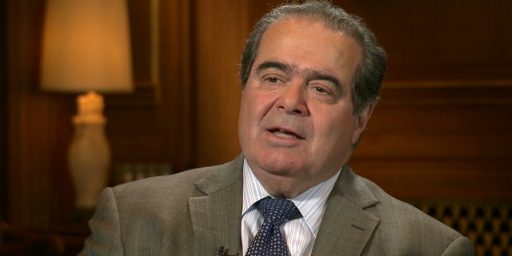Specter: Supreme Court Acting as Super Legislature
Proving that even a stopped clock is right twice a day, Senate Judiciary Chairman Arlen Specter has come to the startling realization that the Supreme Court often makes up rationales to create public policy outcomes it likes.
Specter Plans to Probe ‘Judicial Activism’ (AP)
Senate Judiciary Chairman Arlen Specter plans to use the confirmation of Supreme Court nominee John Roberts to criticize what he calls the high court’s judicial activism, saying Tuesday that justices have started acting as a “super legislature.” I am concerned about the Supreme Court’s judicial activism which has usurped congressional authority,” Specter, R-Pa., said in a letter to Roberts, who will face senators’ questions at his confirmation hearing on Sept. 6.
[…]
Specter warned Roberts at the beginning of the month that he’d be questioned about the Supreme Court’s attitudes toward Congress. In Tuesday’s letter, Specter said he wants the nominee to talk to him about “manufactured rationales used by the Supreme Court to exercise the role of super legislature and make public policy decisions which is the core congressional role under the Constitution.”
Specter said he will question Roberts about two Americans with Disabilities Act cases that the court decided in 2001 and 2004. In 2001, the high court declared the ADA’s Title I unconstitutional in seeking to hold a state liable for employment discrimination, Specter said, but in 2004 the same court upheld the ADA’s Title II in mandating access to a paraplegic who had to crawl up steps to a courtroom. “These decisions pose two major problems,” Specter said. “A lack of stability or predictability in the law because the two cases, decided three years apart, are virtually indistinguishable; and, two, the court’s judicial activism in functioning as a super legislature.” Congress had held hearings around the nation to support the ADA’s passage, but the court said in the 2001 case that the legislative record simply “fails to show that Congress did in fact identify a pattern of irrational state discrimination,” Specter said.
Justice Antonin Scalia, in his 2004 dissent, said the 2001 decision meant the court was setting itself up as Congress’ “taskmaster” and derided the notion that “the courts (and ultimately this court) must regularly check Congress’ homework.” “Isn’t there a lack of respect for Congress demonstrated by the Supreme Court, as Justice Scalia points out that it is ‘ill advised’ for the court to set itself up as ‘taskmaster’ to determine that Congress has done its ‘homework’?” Specter asked.
Granting that most people who study the courts come to this realization as undergraduates (and either think it’s just swell or an outrage, depending on their political leanings) and not after having risen to the chairmanship fo the Judicial Committee, one has to hand it to Specter for his keen insight. Ironically, it comes at a moment when one of the Supreme Court’s more liberal members has a book out saying the courts don’t go nearly far enough in this regard.
Justice Breyer Takes ‘Originalists’ to Task In a New Book (WSJ)
When he was nominated to fill the Supreme Court’s last vacancy, Stephen Breyer said he would strive to make the “law work for people.” Eleven years later — with a new opening on the court and controversy raging over the judiciary’s role — Justice Breyer wants to tell a broader audience how that should be done.
In a book slated for release next month, Justice Breyer — among the more liberal members of the court — gives a detailed insight into his philosophy of deciding cases, namely that the Constitution should be viewed in light of its overarching goal, which he sees as creating a participatory, democratic society. In the process, he offers a rejoinder to a longtime intellectual opponent, Justice Antonin Scalia, who advocates “originalism,” or a more literal interpretation of the Constitution’s meaning at the time of its writing.
“Active Liberty: Interpreting Our Democratic Constitution” explains Justice Breyer’s approach and applies it to some of the most divisive topics that come before the court. These include everything from freedom of speech and privacy rights to affirmative action and last June’s Ten Commandments cases, which addressed the constitutionality of religious symbols on government property.
[…]
The 161-page book, set for publication Sept. 13, aims to popularize ideas Justice Breyer has already advanced in academic lectures and articles. A judge’s task, he says, is construing the Constitution in a way “that helps a community of individuals democratically find practical solutions to important contemporary social problems.” He calls that freedom to participate in government “active liberty,” a complement to passive liberties that protect the individual from interference by the government.
[…]
“Why should courts try to answer difficult federalism questions on the basis of logical deduction from text or precedent alone? Why not ask about the consequences of decision-making on the active liberty that federalism seeks to further,” he writes.
Rep. Tom Feeney, a Florida Republican on the House Judiciary Committee, offers an answer: “Nobody but a subjective, biased judge can determine what active liberty means.” Mr. Feeney, who has been a leader among House Republicans seeking to restrain the judiciary, says a better title for Justice Breyer’s approach would be “jurisprudential mysticism,” since “he thinks he can somehow discern through a crystal ball or a Ouija board what active liberty should produce.”
Anticipating such criticisms, Justice Breyer argues for “judicial modesty” when reviewing acts of Congress, and has been among the least likely of the court’s members to vote to strike down federal laws.
I look forward to reading Breyer’s book, although I tend to agree with Feeney. Like referees, judges should enforce the rules as written rather than trying to influence the outcome of the game.
It should be noted, too, that Scalia is not an “originalist” but a “textualist.” His philosophy is that we can not truly know how the Framers wanted, only what they actually wrote. The Framers were politicians representing vastly different constituencies and ideologies. The Constitution was crafted with many compromises. Scalia believes the courts should interpret the actual text of the Constitution and legislation based on the plain meaning of the words in the context of the times when they were written.






It’s interesting that Breyer is the least likely to strike down federal laws — i.e., the least “activist” judge with respect to federal laws.
Any idea who has voted to strike down most / least state laws?
The court has been out of hand for far to long and has set the precedent that they are the “know it alls” of the people. I put the blame solely on Congress for failing the people by not reigning in the court for the activist decisions made by the court.
Congress has the power to Impeach.
All that needs to be done now is to teach our “wonderful Representatives” in Washington how to spell and define the word.
A 161-page book? And how much are they going to charge for it? $16.99?
*sigh*
Specter: Senator Obvious. This news is at least a century old. I’m glad we’re going to finally get some answers from Congress.